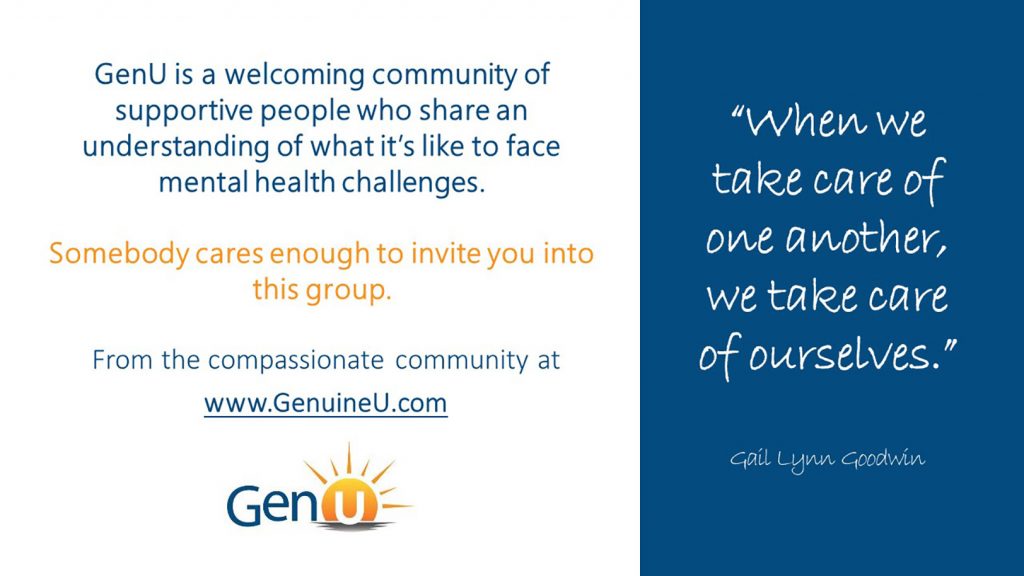Startland News is continuing its segment to highlight area entrepreneurs’ efforts to accelerate their businesses. This is an opportunity for entrepreneurs — like those working on behalf of the mental health support site GenU — to share their crowdfunding stories to gain additional support.
Who are you and what is your organization?

Risa Stein, Rockhurst University
Risa Stein, PhD — I am a clinical psychologist and professor of psychology at Rockhurst University. I’ve taught undergraduates for more than 20 years. I’ve also served as the faculty sponsor for RU’s Chapter of the Year award-winning Active Minds group. Active Minds is a national organization that aims to increase dialogue on college campuses around mental health.
In addition, I am a design thinking and innovation consultant having worked with nonprofits, universities, and research-oriented think tanks. A great deal of my inspiration for GenU came from the training I received when I served as faculty sponsor for the Rockhurst chapter of University Innovation Fellows. UIF is a joint endeavor between the Stanford d.school and VentureWell. I will receive my MA in Management from Rockhurst University in May 2019.

Matthew Barksdale, ZAG FIRST Digital Marketing
My colleague Matthew Barksdale has a passion for starting businesses with a strong focus on technology. His career has focused on leveraging technology to grow promising companies.
Matthew has been involved in industries ranging from publishing to woodworking to agriculture to public relations and has developed more than a hundred digital products utilizing dozens of business models. He holds a BS from the Wharton School at the University of Pennsylvania and an MBA from Rockhurst University.
While I address the clinical side of GenU, Matthew coordinates the technical and business aspects.
Click here for the GenU Kickstarter campaign page.
What’s the Genuine U and why is it needed?

GenU is a mental health support site for college students. The name, “GenuineU,” conveys our belief that we should all be our most genuine selves rather than feeling we must don a façade to hide our mental health challenges. Our tagline, “We’re all in this together,” promotes a sense of community and support.
The aim of www.GenuineU.com is to address what we see as three primary oversights in aiding students with mental health needs:
- Students frequently are not comfortable seeking mental health services. And, unfortunately, finding someone to relate to in an anonymous fashion can be very challenging.
- Students who have learned to effectively cope with their mental health challenges have few uncomplicated and safe means of providing validation, support, and encouragement to their peers. This is particularly dismaying subsequent to a campus tragedy when students may desire to provide a more personal level of comfort to their peers.
- Starting a conversation around mental health with an individual one is concerned about is typically very awkward.
To address these oversights, we’ve created a mobile-ready website where students with lived mental health experience can share videos and blog posts about their mental health journeys so other students who are feeling alone and suffering quietly, can anonymously gain a sense of support. In addition, through our Send a Note of Support feature, anyone can input an individual’s email address and the site will generate a note letting the recipient know that someone sees them and cares and inviting them to join the GenU community.
Recent surveys and research suggest that a documented 45 percent of college students have felt hopeless during college, although approximately 50 percent of students do not disclose their challenges to anyone. About 85 percent of students state they feel stressed on a daily basis. Moreover, students often cite depression and anxiety as among the top impediments to academic performance. In fact, 31 percent of college students have felt so depressed in the past year that it was difficult for them to function and more than 50 percent have experienced anxiety so overwhelming that it became difficult to succeed academically. Sixty-four percent of young adults who drop out of college do so because of a mental health related reason. Overall, 57 percent of students with diagnosable mental health conditions do not request accommodations from their school. As a result of these challenges, suicide is now the second leading cause of death among college students. Clearly, there are many students who do not receive the aid and support they need.
Unlike other apps and online sites, GenU is peer-oriented with a visible community – which promotes the dissolution of stigma.
When people experience mental health challenges, validation from peers has the greatest impact. College students and other young adults strongly prefer to receive encouragement and support from individuals like themselves – even more than from parents or counselors.
Another point of distinction is GenU’s unique capability to fortify the mental health of those consumers already effectively managing their challenges. This group has very limited means of providing personal support to their peers. Particularly in the wake of a tragedy, such as a suicide on campus, students need an empowering outlet to share their stories and let their peers who may harbor similar suicidal thoughts, know they are not alone and that life can get better. There are no other sites or resources that empower students to support one another on such a safe and personal level.
One of the most beneficial aspects of GenU is that there is no capacity for interaction. Students have told us that they appreciate this because know they will not be bothered by internet trolls or haters and that there is no way for complicated relationships to form. All videos are pre-screened before they are uploaded to the site to ensure the message is aligned with the GenU mission. Students who share do not have access to their videos and, hence, cannot obsess about whether their video is being watched or commented on.
Having numerous videos describing various mental health experiences in one safe place, rather than having to search the internet for validation and advice, makes GenU an invaluable resource.
How much money do you hope to raise with your campaign?
Our GenU Kickstarter campaign goal is $2,500. Of course, we would like to raise much more than that to fully optimize the site. Raising $25,000 would enable us to reach the majority of our initial goals.
What do you plan to use the funds for?
The initial $2,500 will cover the costs of hosting the site, the work of the web developer, and filing for nonprofit incorporation.
Right now, we are personally reviewing all the videos. We are also manually cutting and pasting the standard Send a Note of Support message and email addresses when a consumer requests a note to be sent. We are also manually building the database of email addresses. The site will function much more efficiently when we have the funds to automate these functions.
When I attend the Active Minds national conference in March, we expect our traffic will increase significantly. We’d like to raise additional funds to automate the notes and the transfer of emails to a file before then.
Any funds above the $2,500 goal will also help us create a GenU app and to promote in the app through merchandise and outreach including presentations at additional college-oriented conferences.
Once we have the site populated with additional videos, we will channel funds toward creating a Question of the Week feature on www.GenuineU.com. One way we hope to increase the sense of community is to provide an opportunity for students experiencing mental health issues to ask questions of the community and for members to produce short response videos and blog posts addressing the query.
Finally, a longer-term goal, once we secure significant funding and the site has caught on, involves branching out to other vulnerable and frequently distressed populations including high school students, parents of students, veterans, new parents, and caregivers.

How are you differentiating your campaign or bringing attention to it?
One reason we decided to begin with college students rather than say, veterans or new parents, is because of the ways in which college students and those who assist them are organized. Also, since I work with undergraduates, I have access to students who can help spread the word about GenU. I have begun my outreach by contacting the Active Minds corporate leadership. They have secured for me a table at the Expo during the national conference in March. Many RU Active Minds students have also shared the site with their networks.
Since we just completed the preliminary functionality of the site in mid-December, I expect additional traction once the spring 2019 semester begins and the students and I return to campus.
In addition to calling the Active Minds and University Innovation Fellows leaderships’ attention to GenU, I have reached out to administrators of college mental health counselor associations. I also receive Google notifications for campus mental health related articles. When I read about a campus mental health advocate, I try to find their email and reach out to them about GenU. So far, all the responses I’ve received have been uniformly positive and encouraging.
Facebook and LinkedIn have provided the majority of traction to our Kickstarter campaign and the website. My cousin, Romi Dames, who played a recognizable role on the Hannah Montana TV show has created a video for the homepage of GenU. Romi is still a familiar face among this generation of college students and her web presence is significant.
I also reached out to Brad Feld, one of the co-founders of Techstars. Brad was very encouraging and supported our Kickstarter campaign.
Is there anything quirky, fun or unusual you’re trying with your campaign?
One of the things that concerns us most is suicide. Matthew has a daughter in college and my son graduated last May. We are both aware of suicides at our kids’ schools. Moreover, both Matthew and I have high school students and there have been a troubling number of suicides among high schoolers in the KC area.
While it’s not exactly quirky or fun, I’m trying to reach out to administrators of schools where mental health has received increasing attention. When an institution has experienced a suicide, I want to make them aware of the site so they may offer it to their students. Students often desire to support one another in the wake of a tragedy, but feel helpless given their severely limited means of doing so. This is a delicate line to walk since I don’t want to appear morbid in contacting them at such a troubling time, but I want to inform them about GenU to help unite and empower their student body.
There are also significant efforts pertaining to mental health among students underway in the UK. I’ve reached out to European student-run blog sites and organizations to enlist their support for GenU, as well.
What else should people know about the Genuine U or this campaign?
It is very important to Matthew and me that people appreciate that we are not looking to get rich from this endeavor. This is solely driven by a need to create effective and meaningful change. As a parent, faculty member, and psychologist, I know the resources available to students are not adequate. This has resulted in an increasing number of young people suffering needlessly. GenU addresses the primary pain points that have long-been and continue to go unaddressed at educational institutions and our society at-large.
If you or your startup is running a crowdfunding campaign, let us know by contacting news@startlandnews.com




































